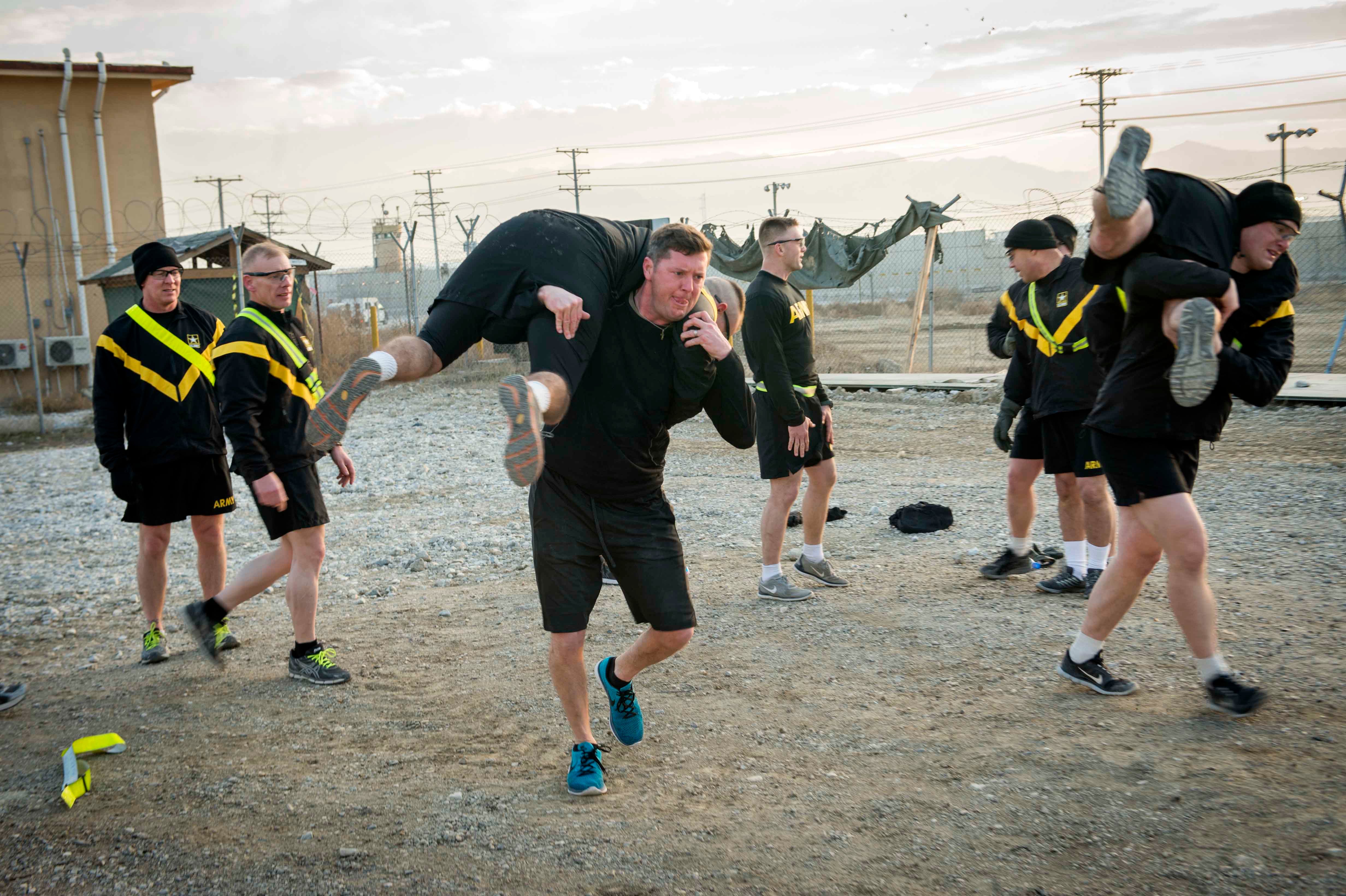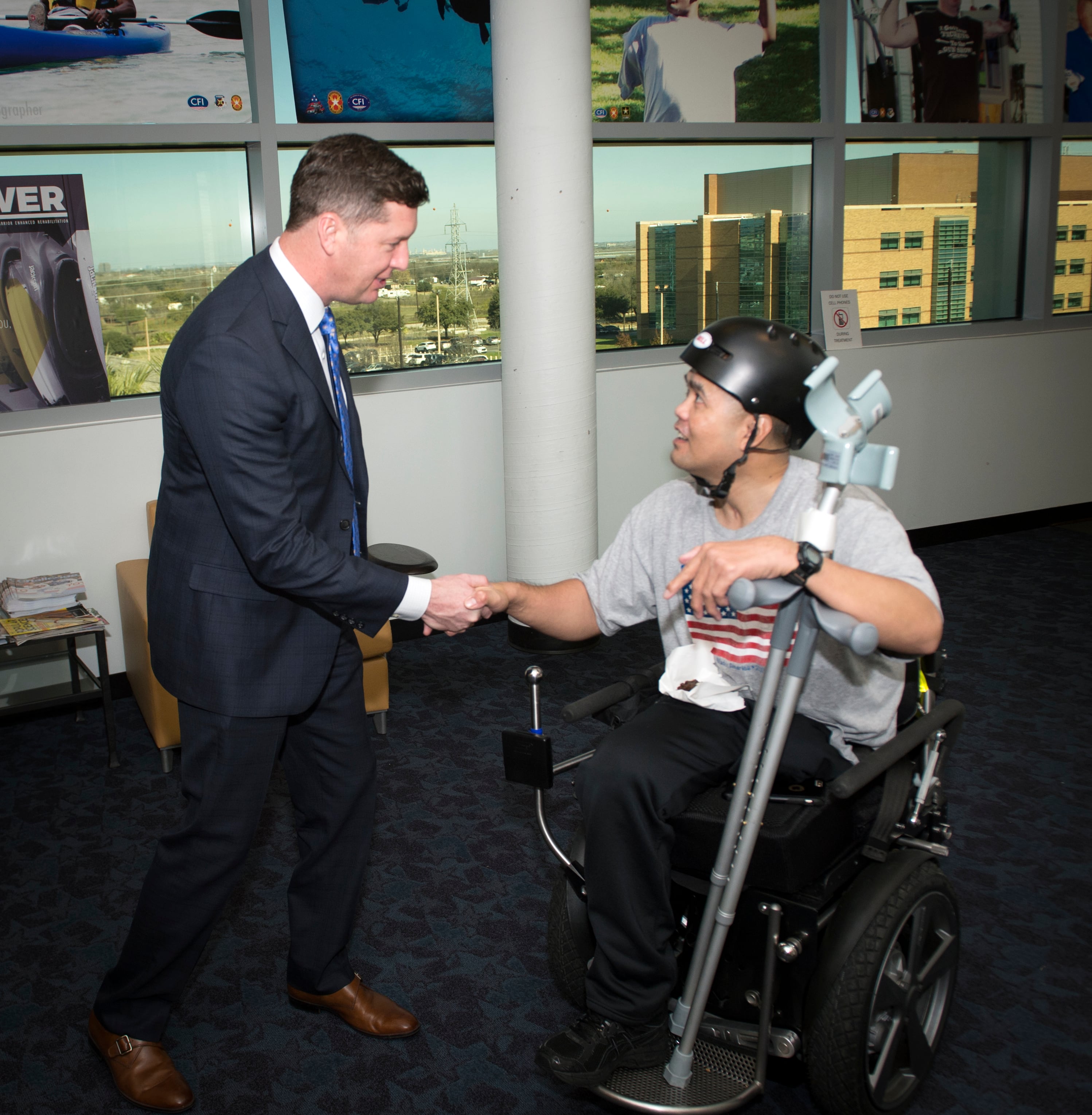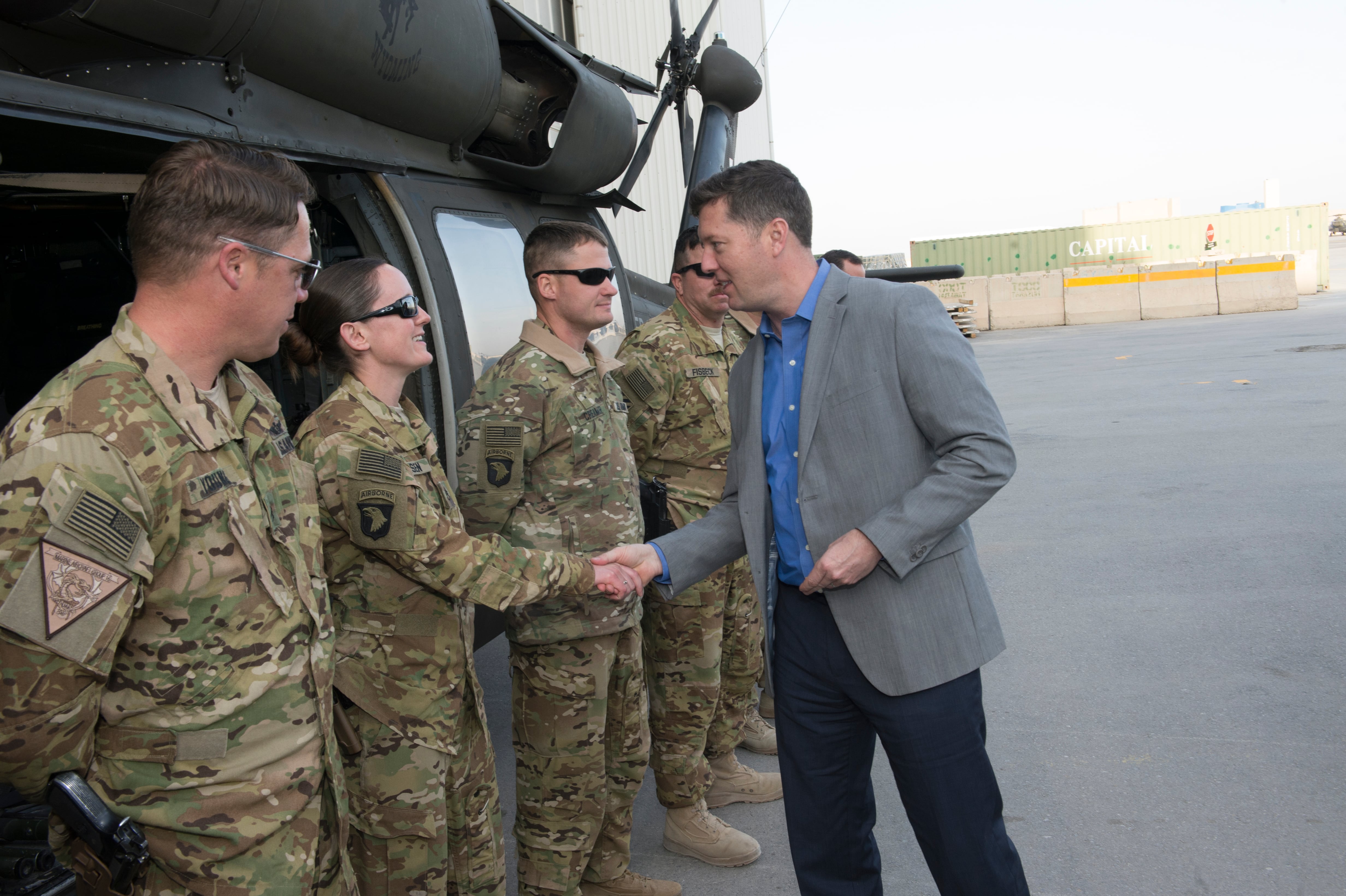Just 12 years after leaving the Army as a captain, Patrick Murphy is now serving as its top civilian leader.
Murphy was sworn in Jan. 4 as the Army's 32nd under secretary; he was appointed acting Army secretary three days later.
"It's great to be back on the Army team," he said. "This is a defining moment in our country's history. We're still on the longest wars in our history in Iraq and Afghanistan, [and] we have an incredible mission, and that's to keep our families safe and to win our nation's wars."
At 42, Murphy likely is the youngest person to serve as acting Army secretary. An Iraq war veteran who was a criminal prosecutor in the 82nd Airborne Division and later an assistant professor at West Point, Murphy now has statutory responsibility for all matters relating to the Army. This includes 1.4 million soldiers and civilian employees, installations, weapons systems and equipment acquisition, and financial management.
Murphy is serving as the acting secretary while Eric Fanning, who was nominated for the job in September, awaits Senate confirmation.
Sen. Pat Roberts, R-Kan., placed a hold on Fanning's nomination last fall and is seeking assurance from the administration that prisoners from Guantanamo Bay, Cuba, will not be relocated to Fort Leavenworth, which is home to the U.S. Disciplinary Barracks, in Kansas. Roberts on Tuesday blasted the plan the Defense Department submitted to Congress to close the facility and said his hold on Fanning's nomination will continue.
In his role as the under secretary, Murphy is the Army's principal adviser on matters relating to the management and operation of the Army, including development and integration of the Army Program and Budget.
"I really wasn't surprised when he got nominated [for the job], because he knew he had more to give and I did, too," said Jennifer Williamson, a former captain who served with Murphy in the 82nd Airborne. "I think he's going to do a great job, and I think he's going to be able to relate to all of our soldiers in a way that's uncommon for someone in that position, and I think our soldiers are going to benefit from that."
In the seven weeks since he took on the additional role of acting secretary, Murphy has visited troops in Texas, Iraq and Afghanistan. The former congressman from Pennsylvania — he was the first Iraq war veteran elected to Congress, serving from 2007 to 2011 — said he was inspired by the troops he met.
"It's hard not to be inspired when you're back with soldiers who are on the front lines doing God's work," Murphy said. "There are people over there that wake up and want to kill our families here at home, and so to see how [service members] are making sure that the lessons learned from 9/11 aren't forgotten, that we're doing everything possible to not allow those areas to be a safe harbor for terrorists, to see how they're accomplishing that mission, is critically important."
During his trip downrange, Murphy said he was "very clear" to the combatant commander that "we would do everything as the Department of the Army to make sure that we man, equip and train our soldiers and empower them to accomplish our mission."

Acting Army Secretary Patrick Murphy conducts physical fitness training with 10th Mountain Division soldiers in Afghanistan. Murphy, a former Army captain, was makes it a point to PT with soldiers whenever he can.
Photo Credit: Army photo
As he travels across the Army, Murphy also makes it a point to join soldiers during their morning physical fitness training sessions.
"Everywhere I was, whether it was in Baghdad or Kabul or Kandahar, I was PTing with soldiers because … it's that moment of shared sacrifice," Murphy said. "Development of individual physical readiness is important to me. Being proactive and aggressive when it comes to mental and physically resilient is critically important to meeting our missions."
Juan Arevalo, a former sergeant and paralegal in the 82nd Airborne, served in Iraq with Murphy.
The young captain was genuine and accessible to his soldiers, Arevalo said.
"As an officer, he didn't have to do a lot of things like guard shifts and whatnot, but he would still do them," Arevalo said.
Murphy also put together a newsletter every quarter, complete with photos and "corny" jokes, to send to his soldiers' families to keep them updated on the deployment, Arevalo said.
"I was younger then, and I didn't really write or call home as much as I probably should have," he said. "Now I see my mom really, really appreciated hearing how we were doing."
Arevalo said he was happy when he learned about Murphy's new job.
"Everyone says they care about soldiers when they're in the public eye, but I was able to see him back when nobody else really cared, and I thought he genuinely cared about us," Arevalo said.
Williamson agreed.
Murphy "has a passion for taking care of people," she said. "Whether it was the first thing in the morning at PT, or in Baghdad during a deployment, he was always full of energy, and he always made people smile. He went out of his way to make sure that he was doing the most he could in the situation he was in."

Acting Army Secretary Patrick Murphy meets with a wounded warrior during a visit to San Antonio Military Medical Center in January 2016.
Photo Credit: Army photo
As he settles into his new role, Murphy is responsible for an Army that continues to shed soldiers, grapple with shrinking budgets and face growing threats around the world.
He outlined for Army Times some of his priorities.
Improving readiness.
When Murphy left Congress five years ago, the Army had a $240 billion budget and 45 active-duty brigade combat teams, he said. Last year, the Army's budget was down to $143 billion and it had just 31 BCTs in the active Army.
"I look at that and it's a pretty stark cut in our funding, and I think it's given us an increased strain that presents great risk to our soldiers and their families," Murphy said.
Those cuts become even more concerning when faced with "an emerging and aggressive Russia," the Islamic State terror group in Iraq and Syria, and the ongoing missions in Iraq and Afghanistan, he said.
Reducing non-deployable troops.
About 100,000 soldiers, or 10 percent of the Army, are currently non-deployable, Murphy said.
"That is not good, and we need to get after it," he said. "We need to let [soldiers] know we need them on the team, we need them on the field, to do what's necessary to take the fight to the enemy and protect our families at home."
One way to reduce the number of non-deployable soldiers is through a competitive mindset and making sure soldiers are taking care of themselves by staying healthy, eating right and getting the proper amount of sleep, Murphy said.
Reconnecting with Army veterans.
Murphy is a big proponent of the Army's Soldier for Life program.
"When you leave the Army, whether it's three years or 30 years, you're still part of the Army family," he said. "Although there are about 1.3 million people on the Army team, there are also 9.5 million American veterans out there that are Army veterans that we want to do a better job of connecting with."

Acting Army Secretary Patrick Murphy meets with soldiers during a recent visit to Afghanistan.
Photo Credit: Army photo
Connecting with soldiers.
Murphy regularly sends e-mail updates to the force — all 1.3 million soldiers and civilians.
"There are certain leadership principles that I learned at age 19 and when I served in the 82nd Airborne Division in Iraq," he said. "You stand in front of your men and women, and you let them know what you stand for, and you provide clear guidance."
That's why he tries to PT with soldiers every chance he can get, but "I can't PT with every soldier in the Army," he said.
The regular e-mails are a way to keep soldiers informed about what he's doing and what he's seeing across the force, Murphy said.
Murphy also is active on social media; he often — "90 percent of the time" — personally writes his own Facebook posts and Twitter messages. You can follow him on Facebook here and Twitter here.
"I think it's important to tell the Army story," he said. "Our soldiers and their families are doing an incredible job out there every day to make a positive impact on people's lives, and we have to tell that story."
Michelle Tan is the editor of Army Times and Air Force Times. She has covered the military for Military Times since 2005, and has embedded with U.S. troops in Iraq, Afghanistan, Kuwait, Haiti, Gabon and the Horn of Africa.
